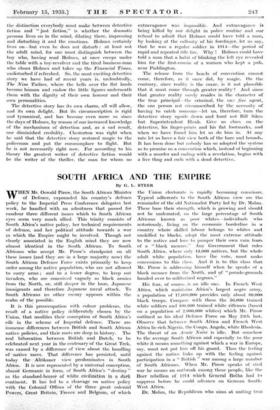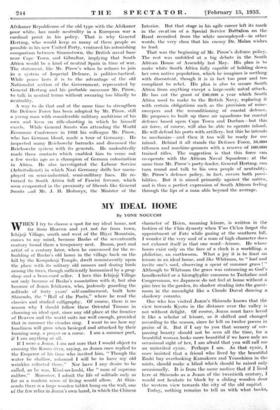SOUTH AFRICA AND THE EMPIRE
By G. L. STEER WHEN Mr. Oswald Pirow, the South African Minister of Defence, expounded his country's defence policy to the Imperial Press Conference delegates last week, he handled with an adroitness that passed for candour three different issues which to South African eyes seem very much allied. This trinity consists of South Africa's native policy, her technical requirements of defence, and her political attitude towards a war in which the Empire might be involved. Though not clearly associated in the English mind they are now almost identical in the South African. To South Africans who accept Mr. Pirow's standpoint on all these issues (and they are in a. large majority now) the South African Defence Force exists primarily to keep order among the native population, who are not allowed to carry arms;' and to a lesser degree, to keep out invaders, who are -conceived vaguely as black armies from the North, or, still deeper in the haze, Japanese immigrants and therefore Japanese naval attack. To South Africans no other enemy appears within the realm of the possible.
It is this' preoccupation with colour problems, the result of a native policy delitierately chosen by the Union, that modifies their conception of South Africa's role in the scheme of Imperial defence. There are immense differences between British and South African native policies, and their roots are deep in history. The real bifurcation between British- and Dutch, to be celebrated next year in the centenary 'of the Great Trek, was caused" by a difference of view about the handling of native races. That difference has persisted, until today the Afrikaner view predominates in South 'Africa. It is now represented by a universal conception, almoif Germanic in form, of South Africa's " destiny " as the standard-bearer of white civilization in a dark continent. It has led -to a cleavage on native policy with the Colonial 'Offices of the three great colonial Powers, Great Britain, 'France and Belgium, of Which the Union electorate is rapidly becoming conscious. Typical adherents to the South African view are the remainder of the old Nationalist Party led by Dr. Malan. These base their strength, which is growing and should not be underrated, on the large percentage of South Africans known as poor whites—individuals who notoriously, living on the economic borderline in a country where skilled labour belongs to whites and unskilled to blacks, adopt the most extreme attitude to, the native and love to pamper their own vain fears of a "black menace." Any Government that rules South Africa, where only 13,000 natives, but the whole adult white population, have the vote, must make concessions to this class. And it is to this 'class that Mr. Pirow is addressing himself when he speaks of a black menace from the North, and of "parade-grounds handed over to militarized negroes."
His fear, of course. is an idle one. In French West Africa, which maintains Africa's largest negro army, a population of 17,000,000 provides only about 80,000 black troops. Compare with these the 56,000 trained white soldiers and 100,000 trained white riflemen (based on a population of 2,000,000 whites) which Mr. Pirow outlined as' his ideal Defence Force on May 24th last. Observe that between South Africa and French West Africa lie rich Nigeria, the Congo, Angola, white Rhodesia. .The threat of an Armee Noire is idle. But somehow to the average South African and especially to the poor white it means something against which a war in Europe, say, must not .put him off his guard. Thus the feeling against the native links up with the feeling against participation in a " British " war among a large number of South Africans. When Mr. Pirow speaks of civil war he means an outbreak among these people, like the Boer rebellion of 1914 which General Botha had to suppress before he could advance on German South- West 'Africa.'
Dr. Malan, the Republican who aims at uniting true Afrikaner Republicans of the old type with the Afrikaner • poor white, has made neutrality in a European war a cardinal point in his policy. That is why General Hertzog, who would keep as many of these people as possible in his new United Party, ventured his astonishing comparison between Simonstown, the British naval base near Cape Town, and Gibraltar, implying that South Africa would be a kind of neutral Spain in time of war. The statement, like Mr. Pirow's when he refuses to join in a system of Imperial Defence, is politico-tactical. .While peace lasts it is to the advantage of the old Nationalist section of the Government, represented by General Hertzog and his probable successor Mr. Pirow, to talk in neutral terms without swearing too blindly to neutrality.
A way to do that and at the same time to strengthen the Defence Force has been adopted by Mr. Pirow, still a young man with considerable military ambitions of his own and keen on rifle-shooting in which he himself excels. While General Smuts was attending the World Economic Conference in 1933 his colleague Mr. Pirow, who has German blood, made a tour of Germany. He inspected many Reiehswehr barracks and discussed the Reichswehr system with its generals. He undoubtedly made those contacts which enabled him to come out a few weeks ago as a champion of German colonization in Africa. He also investigated the Labour Service (Arbeitsdienst) in which Nazi Germany drills her unem- ployed on semi-industrial, semi-military lines. He re- turned to South Africa full of Fascist fervour, which soon evaporated in the proximity of liberals like General Smuts i..nd Mr. J. H. Hofmeyr, the Minister of the -Interior. But that stage in his agile career left its mark • in the crtat'on of a Special Service Bafta,lion on the Rand recruited from the white unemployed—in other • words, the very class that his enemy Dr. Malan wishes to lead. That was the beginning of Mr. Pirow's defence policy.
• The rest was unfolded at a big debate in the South African House of Assembly last May. His plan is to make white South Africa fully capable of holding down her own native population, .which he imagines is seething with discontent, though it is in fact too poor and top compliant to rebel. His plan is also to secure South Africa from anything except a large-scale natral attack.
• He has cut the grant • of 180,000 a year which South Africa used to make to the British Navy, replacing it with certain obligations such as the provision of mine- sweepers and the reconditioning of coastal defence. He proposes to built up three air squadrons for coastal defence based upon Cape Town and Durban—but this air force, of course, will also be able to operate inland. He will defend his ports with artillery, but this he intends to mechanize—and then it too will be ready for use inland. Behind it all stands the Defence Force, 56,000 riflemen and machine-gunners with a reserve of 100,000 trained rifles. The suggestion. is that this force can co-operate with the African Naval Squadron: . at the same time Mr. Pirow's party-leader, General Hertzog, can turn round and talk to his own people of neutrality. Mr. Pirow's defence policy, in - fact, covers both possi- bilities. But it is aimed primarily against the native, and is thus a perfect expression of South African feeling through the lips of a man able beyond the average. -











































 Previous page
Previous page